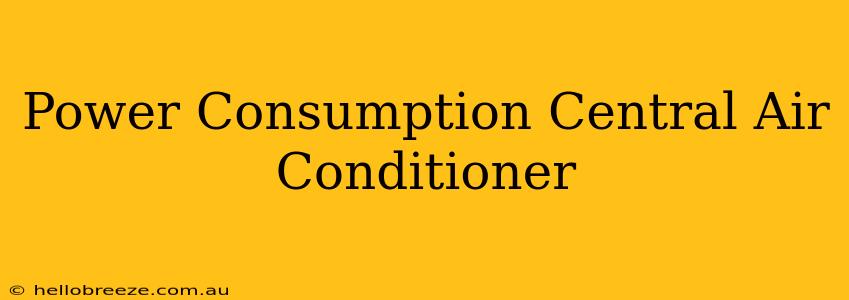Central air conditioners are lifesavers during scorching summers, but their significant power consumption can lead to hefty electricity bills. Understanding how much energy your system uses and how to optimize its efficiency is crucial for both your comfort and your wallet. This comprehensive guide delves into the factors influencing central AC power consumption, providing actionable strategies for reducing your energy usage and saving money.
Factors Affecting Central Air Conditioner Power Consumption
Several factors contribute to the power consumption of your central AC unit. Understanding these factors is the first step towards managing your energy usage effectively.
1. Size and Type of Air Conditioner:
The size of your AC unit plays a crucial role. An undersized unit will struggle to cool your home, running constantly and consuming more energy. Conversely, an oversized unit will cool too quickly, cycling on and off frequently, potentially leading to higher energy use in the long run. The type of AC unit (single-stage, two-stage, or variable-speed) significantly impacts its efficiency. Variable-speed units are generally the most energy-efficient.
2. SEER Rating:
The Seasonal Energy Efficiency Ratio (SEER) rating indicates the cooling efficiency of your air conditioner. A higher SEER rating means greater efficiency and lower energy consumption. Look for units with high SEER ratings (16 or higher is generally considered efficient). Understanding your current unit's SEER rating helps in comparing potential upgrades.
3. Home Insulation and Sealing:
Poor insulation and air leaks drastically increase the workload of your AC, boosting energy consumption. Heat escaping through poorly insulated walls, windows, and doors forces the unit to work harder to maintain the desired temperature. Investing in proper insulation and sealing will significantly improve energy efficiency.
4. Thermostat Settings and Usage:
The temperature you set on your thermostat directly influences your energy consumption. Every degree you lower the temperature increases energy use. Consider raising the thermostat setting a few degrees when away from home or asleep to conserve energy. Programmable or smart thermostats offer automated temperature adjustments for maximum efficiency.
5. Maintenance and Air Filters:
Regular maintenance is essential for optimal performance and energy efficiency. Dirty air filters restrict airflow, forcing the unit to work harder and consume more energy. Change your air filters every 1-3 months, or more frequently if you have pets or allergies. Schedule annual professional maintenance for cleaning, inspection, and refrigerant checks.
6. Sunlight Exposure and Shading:
Excessive sunlight entering your home increases the cooling load, leading to higher energy consumption. Employ shading techniques such as blinds, curtains, awnings, or strategically planted trees to reduce solar heat gain.
7. Humidity Levels:
High humidity increases the workload of your AC unit as it needs to dehumidify the air in addition to cooling it. Improving ventilation and utilizing a dehumidifier can reduce the burden on your AC, saving energy.
Reducing Central Air Conditioner Power Consumption: Practical Tips
Here are some practical steps to significantly reduce your central AC's power consumption:
- Upgrade to a high-SEER unit: Consider replacing your old, inefficient unit with a high-SEER model for long-term savings.
- Improve home insulation: Seal air leaks and add insulation to walls, attic, and floors to minimize heat loss and gain.
- Use a programmable or smart thermostat: Optimize temperature settings based on your schedule for automated energy savings.
- Regularly clean or replace air filters: Ensure optimal airflow and prevent the unit from overworking.
- Schedule annual professional maintenance: Prevent costly repairs and ensure peak efficiency.
- Utilize shading techniques: Reduce solar heat gain by using blinds, curtains, or awnings.
- Consider a whole-house fan: Circulate cooler air effectively during evenings and nights.
Conclusion: Conserving Energy and Saving Money
By understanding the factors influencing your central air conditioner's power consumption and implementing the strategies outlined above, you can significantly reduce your energy usage and save money on your electricity bills. Remember that even small changes can lead to noticeable reductions in energy consumption over time. Prioritizing regular maintenance and mindful thermostat usage are crucial for maintaining a comfortable home while minimizing environmental impact.

